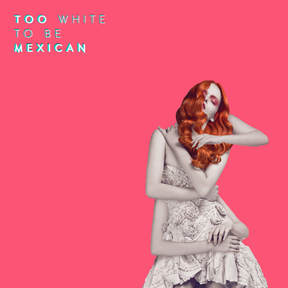 Borrowed from Google. Check out Giovanni Escalera's collaborative multimedia project: https://toowhitetobemexican.bandcamp.com/ Borrowed from Google. Check out Giovanni Escalera's collaborative multimedia project: https://toowhitetobemexican.bandcamp.com/
I NEVER FELT MEXICAN. NOT REALLY.
I've written several times about growing up as a privileged half-Latina, white-passing American, and I cannot stress how embarrassing it was to never really meet anyone else going through this. And isolating. Every time I met another Latinx person, I felt like a fraud. I even considered joining my school's Amigas Unidas organization, or the Sigma Lambda Gamma chapter, but I felt "too white" to join. I kept feeling like I had to prove that I knew Spanish, kept apologizing for my grammar. I pretended like I understood the slang jokes that everyone else made. I was lying. I am a proud Latina; I'm proud of the legacy that my Mexican grandparents have set, the stories of perseverance that they told about growing up prior to Cesar Chavez's labour movement. I grew up as a young Mexican girl in Fresno, but my story was far from that of Gary Soto's--I lived in the suburbs, not the barrio; I went to private, magnet, and charter schools and had an attentive mother who nagged me about my grades; there was never any question about whether I was going to college or not, and I even thought of Fresno State as a fallback school rather than something to aspire to*. And to make matters worse: I was never racially profiled. This sounds like a good thing, doesn't it? And it is, to an extent. But it's distressing in that my brother and I have drastically different experiences with this, despite having the same racial blood makeup.
0 Comments
T/W: Graphic description of human miscarriage.  AUTOMATIC TOILETS ARE THE BANE of my everyday existence. They’re supposed to be eco-friendly, okay. So why do they flush while I’m squatted over the toilet, trying to wipe myself with some dignity? (I suppose my first mistake was trying to wipe with dignity; no one can achieve the impossible.) I end up double-flushing, wasting the water I would have otherwise saved. It flushes when I’m not ready, achieving an impressive portfolio of misdemeanors every year. The most common it when it completely catches me off-guard when I’ve just put the seat cover down and haven’t even unbuttoned my pants yet. The least common was when it swallowed my baby. 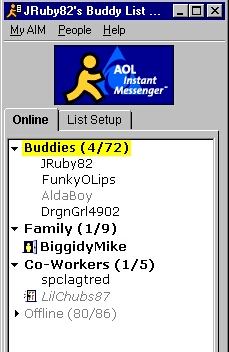 OH, AIM. WE GO WAY BACK. How many relationships have you recorded over time? How many friendships continued, romances kindled, feelings hurt and rejuvenated and cycling all over again? How many sexbots have I encountered through you when my password was hacked? How often have I spent clicking open your vertical portal, windows popping open as the distinctive bloo-do-doop invites me to a new surprise? Late nights in front of the glow of my computer screen were the norm throughout high school, undergrad, grad school. Even now, in the "real world," I cling on to the bit of nostalgia that you offer--that same, unchanging sound that was there when I met my best friends, when I flirted with my first boyfriend, when I had my first kiss. I spent countless two-AMs with you, hiding in my bed and pretending to write papers while I was not-so-secretly hanging out with my friends. This post was written by my fellow writer friend Hank Whitson. His words are re-published here with his permission. 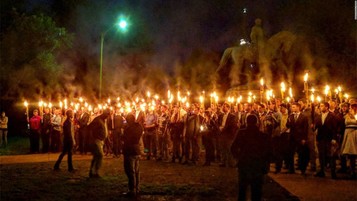 Battle of Charlottesville, 2017. Image from CNN. Battle of Charlottesville, 2017. Image from CNN. BRIANNA JOHNSON MARCHES AGAINST THE PEOPLE who've cast aside their white sheets and wear their hate with pride. They yearn for a hierarchy of melanin that places her at the bottom of the food chain. She's marched before, and she'll march again. What else can she do? She's tried chanting louder. She tried taking the blows, running away, and fighting back. Those marching with her have picked her up, shielded her body, and fought alongside her. Together they've kindled the faith that love will eventually triumph, fostered the hope that history's long arc will bend toward justice in their lifetime. She can't help but doubt it though. She can't help but wonder what it will take for the turning point to come, and what else waits between now and then. 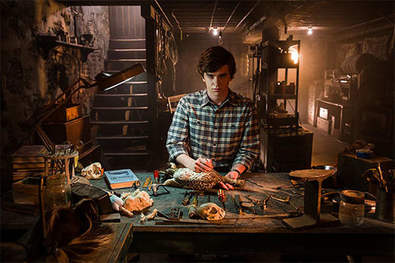 Freddie Highmore practicing taxidermy as Norman Bates in "Bates Motel" Freddie Highmore practicing taxidermy as Norman Bates in "Bates Motel" TRIGGER WARNING: graphic image included. I DON'T TYPICALLY TALK ABOUT SERIAL MURDERERS, but when I do, chances are Freddie Highmore is probably involved. Okay, to be fair, I've only written a post about serial murderers this one time. But I--like plenty of other people, probably--am SUPER interested in them, possibly because they are really interesting. And I'm not the only one--loads of people are intrigued by serial murderers. We whisper things about them in the same way we talk about a pretty girl's suicide--like ghost stories that permeate our towns, like attractive mysteries to be solved, like they're only stories. Part of this is likely because our media sensationalizes serial murderers and suicides. But the other part of it is likely because murder is a delicious, faraway topic for most people, and so we have a difficult time understanding why it is that a serial murderer kills--or why they have an MO. Like--take the Black Dahlia murder, for instance. The Black Dahlia was a nickname given to Elizabeth Short, a woman murdered in 1947 here in LA in a distinct, ultra-creepy way: drained of blood, clean, and in two pieces. 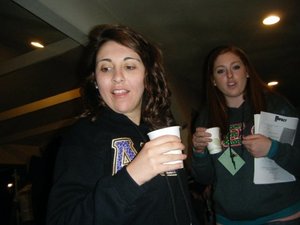 Behind every successful woman is several hundred cups of coffee Behind every successful woman is several hundred cups of coffee HERE'S THE NAKED TRUTH: being a sorority girl is everything you think it is--and also nothing at all like that. What was real: The constant social events, the coordinated singing, the incessant squatting for photos, the ubiquitous use of Sorority Terminology (i.e., "biz-cajsh" for "business casual"), the secret rituals, the petty fighting, the excessive coffee drinking. What wasn't real: Hazing, naked lesbian pillow fights*, only dating frat boys, not caring about grades**, superficiality, excessive partying, sluttiness, slut-shaming, racism. What we didn't focus on, but what was there (and still is):
My sorority was small--an 8-to-25-member chapter whose membership was constantly in flux, on a campus where 60-to-120-member chapters were the norm. On the East Coast, my sorority is huge, spanning 37 chapters between Florida and New York. But on the West Coast? Eight. Eight chapters from San Diego to Seattle, and that's including Arizona. So it was no wonder that UCI's installment has lingered around 12 members strong (on average) since its incarnation. It's also a culturally Jewish sorority, and considering the tension between the Jewish and Palestinian communities in Irvine***, it's no wonder that the Jewish (and Jewish-supporting) population at UCI would be afraid to come out of the woodwork and stand in solidarity as three widely-scoffed-at things: Jewish, women, and sorority girls. But despite its small size and the pre-existing oppression that has been part of its culture for over a decade, this sorority has presented a genuine intention and a tightly-knit community that has been extremely supportive, and I recently had an interaction with the current active members that legitimately gave me hope for the world: IT'S SUCH A DISAPPOINTMENT when I hear people tell me, "Oh, I don't read." It's not so much that I want people to read because I want them to contribute to the industry and I want them to buy my books; it's more that I don't quite understand it. Public education has (so far; subject to change any way now) been provided up through high school in this country since circa 1892; literacy rates are at an all-time high, even though they virtually haven't changed in the last ten years and there's still a lot of work that needs to be done in this area, but organizations like Reading Partners (AmeriCorps, so long as it isn't de-funded) tackle head-on. E-readers have provided an unprecedented increase in accessibility to a million books in one little package; libraries remain free (provided you have an address, which is still a barrier for our homeless neighbors but some libraries are actively working to provide for their homeless patrons). I understand that book deserts are a thing, but the people from whom I hear "I don't read" aren't generally in/from book deserts; no, these are people with access to books and people with time to read, if they choose to dedicate/allocate it so.
I have a few theories as to why this is the case, particularly drawing from my own experience with reading, so I'll start with my own reading history:
For the last few months I've been slowly trudging my way through George Orwell's 1984. I say "slowly" not because the book is bad (it's excellent) but because I'm a slow reader with a full-time job, a part-time weekend job, and a busy social calendar. I'm privileged, in every way--too busy managing my life to read a book. A book that I should have read years ago, particularly with my graduate thesis on dystopian literature, because Zamyatin's We was unquestionably (now, I see) not enough. It doesn't matter that it inspired 1984; the thinly veiled protest essay that is We does not quite engage like Orwell's classic. I'm not a fan of reading books just because they're classics--why should I read books by dead white guys who've never had a life like mine?--but I started reading 1984 for a reason I don't usually pick up books: because it was a classic, and I felt I should. If my work is dystopian, I should know dystopias. Particularly the book that everybody mentions when you say, "...and I don't mean The Hunger Games."
Today I saw President Trump (I, like so many of my fellow Americans--comrades?--flinch when I combine these words together) say he's putting an end to the war on coal. I watched him do other things, too, other times: brag about sexual assault, attempt to block legal residents from entering the country based on how they looked, destroy native American land, encourage violence. In grad school, as part of my thesis work, I read The Handmaid's Tale. It is one of the most prominent dystopic works written by a female author, and I was obsessed with it. One of my grad school professors said that the third-grade girls we taught loved death and found it all very romantic, and I suppose the same was true for me as a third-grader: death was horrible, unfair, and poetic. While growing up I was particularly obsessed with mass, systematic, nonsensical murder. Serial murderers, the Holocaust, the mysteries of Roanoake. Haunted spaces with too many violent deaths to be comfortably explained; the dead planet of Miranda in "Serenity;" the purple Kool-Aid leaders who poisoned entire cities. The slave trade, the FLDS. Today I saw Trump supporters comment on how The Handmaid's Tale is anti-Trump propaganda. hairy eyebrows
double chin bad breath see you're awake I'm in a smelly cloud of farts push-pins keep girls prettier than me on the wall I watch their smooth faces all day long I couldn't even look at the scale today.
I remember hearing an adult very close to me--a female adult very close to me--tell me, when I was turning 11 years old, that this was the age at which most girls "start to balloon." I danced 10-20 hours a week from then until I was 22 years old. I was 108 pounds graduating from high school. Too skinny, most people said. Bean pole, my ballet teacher called me. Grasshopper, my best friend called me. In middle school, I read a book about Axell-Crowne Syndrome, Life in the Fat Lane. I thought: that'll never happen to me, but how horrible that it happened to this character. I learned about self-image issues. I learned about anorexia and how you're not supposed to have it. I learned about bulimia and how you're not supposed to hide it. I got tiny boobs that I saw through my leotard. In high school, I was too busy being anxious about my acne to care about my weight. I thought: it's okay that I have zits in my T-zone, because I won't get them around the rest of my face. Then they spread toward the outside of my face, lined my jawline like green plastic army soldiers swarming for a battle. I was nerdy. I had a big mouth. I was uncool. I was perpetually tardy. My mom told me not to eat junk food. I ate it anyway and never got bigger. Freshman year of college, I gained 10 pounds. At first I was afraid of them--then I noticed I'd started getting hips. Boobs. I was getting curves. 118 pounds and I was afraid more than anything else about acne. I was put on Accutane. My face got flaky and I had to remind myself, every day, that I wasn't ugly. I had a boyfriend. Someone liked me, right? The longer the relationship went on, though, the more I thought my boyfriend only told me I was beautiful because I had low self-esteem. I always wore makeup. I didn't read magazines, hardly watched TV, but I knew my acne made me undesirable. If I wore makeup, I was pretty. But I didn't have that natural beauty everyone was starting to talk about. Mine was fabricated. Came from a plastic box and a brush. Everyone was just too kind to tell me the truth. |
PART OF THIS COMPLETE BREAKFASTBlog not recommended for sober consumption. |
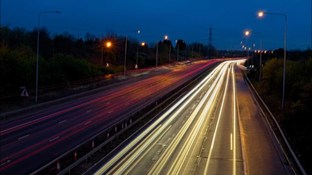
 RSS Feed
RSS Feed